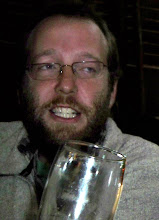JFC
Atheists do not like being called fundamentalists, and from what I know of capital-F Fundamentalism, this dislike is well-founded. But I am not sure the Economist's blogger does a good job defending atheists, or contrasting them with religious fundamentalists.
The blogger bothers to define the fundamentalist mindset in the fifth of six paragraphs, and does so as "one that cannot be changed by evidence." I believe the original accuser (uncited bloggers) would have defined it as rigorous adherence to a set of basic principles, which definition does indeed apply to many atheists I know.
Now, most atheists I know are fundamentalist skeptics, meaning that the only basic principles they adhere to are empirical evidence and reason, which, let me aver, are the best principles we humans have to rely on. When going about our daily lives, teaching our children, hopping on airplanes, healing our sick, etc., they're what we all go by, and the religious fundamentalist who forgets this can go and give up bacon.
But strictly speaking, it takes a fundamentalist point of view to espouse atheism. For to deny that there's a god because you haven't been shown sufficient evidence for one implies rigid adherence to a system of understanding the universe based on human capabilities. I grant that such a system is practically superior to anything preferred by those who believe they have some kind of personal insight to, or communication with, a god, but it's fundamentalist all the same.
A step away from such rigidity is to admit that a god, as defined by most who believe in one, is outside the realm of judgments that a rational skeptic may make. That may be called agnosticism, which tag for subtle reasons I don't really like, but more on that another time. An atheist friend once said that what I have described is essentially a coward's atheism. What's in a name?
I don't advocate for people believing in god; I don't feel qualified to. I am skeptical of anybody who does. But atheists, agnostics, and whatever I am shouldn't pretend that the underlying reality of the Universe defers to the human mind. It is the other way around, and our mind should be open to that. How else is that majestic Hypothesis step of the scientific method to form?
The blogger bothers to define the fundamentalist mindset in the fifth of six paragraphs, and does so as "one that cannot be changed by evidence." I believe the original accuser (uncited bloggers) would have defined it as rigorous adherence to a set of basic principles, which definition does indeed apply to many atheists I know.
Now, most atheists I know are fundamentalist skeptics, meaning that the only basic principles they adhere to are empirical evidence and reason, which, let me aver, are the best principles we humans have to rely on. When going about our daily lives, teaching our children, hopping on airplanes, healing our sick, etc., they're what we all go by, and the religious fundamentalist who forgets this can go and give up bacon.
But strictly speaking, it takes a fundamentalist point of view to espouse atheism. For to deny that there's a god because you haven't been shown sufficient evidence for one implies rigid adherence to a system of understanding the universe based on human capabilities. I grant that such a system is practically superior to anything preferred by those who believe they have some kind of personal insight to, or communication with, a god, but it's fundamentalist all the same.
A step away from such rigidity is to admit that a god, as defined by most who believe in one, is outside the realm of judgments that a rational skeptic may make. That may be called agnosticism, which tag for subtle reasons I don't really like, but more on that another time. An atheist friend once said that what I have described is essentially a coward's atheism. What's in a name?
I don't advocate for people believing in god; I don't feel qualified to. I am skeptical of anybody who does. But atheists, agnostics, and whatever I am shouldn't pretend that the underlying reality of the Universe defers to the human mind. It is the other way around, and our mind should be open to that. How else is that majestic Hypothesis step of the scientific method to form?


0 Comments:
Post a Comment
Subscribe to Post Comments [Atom]
<< Home